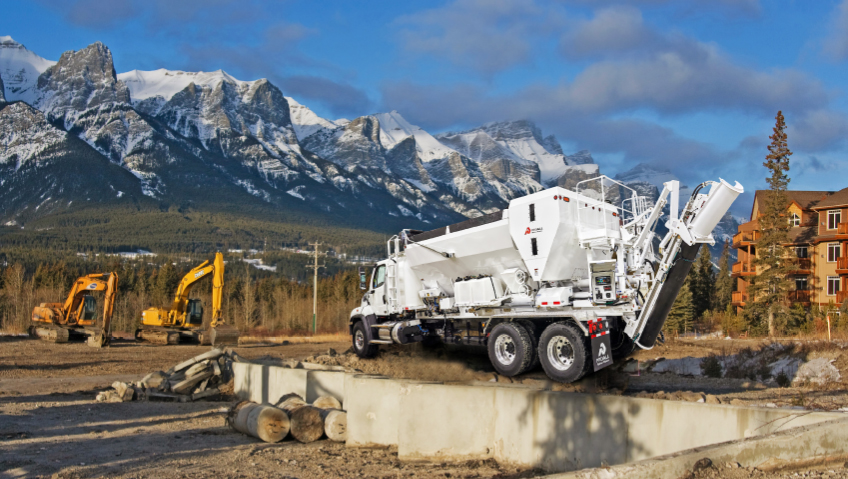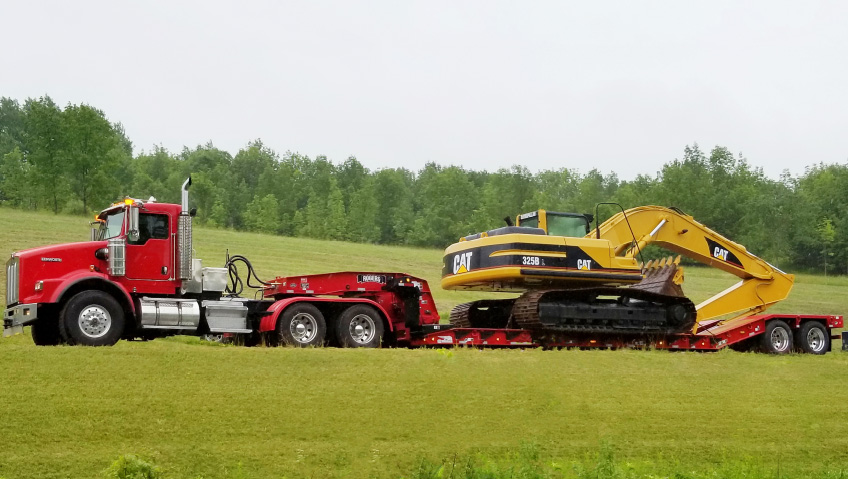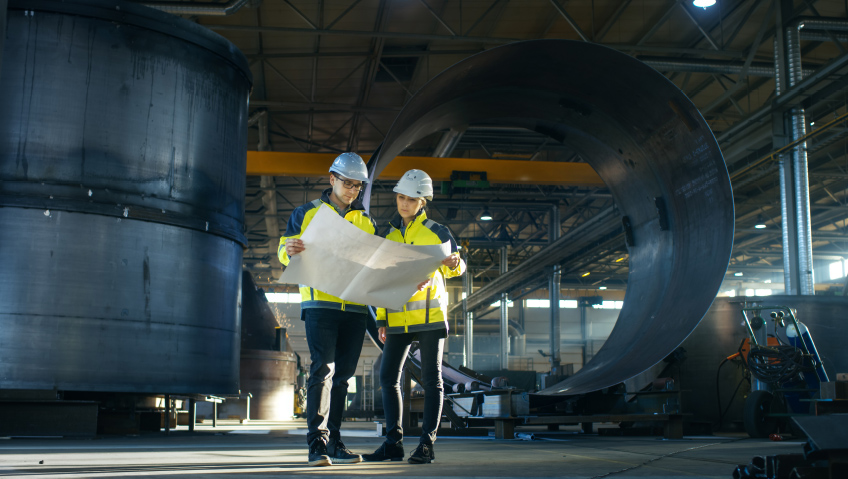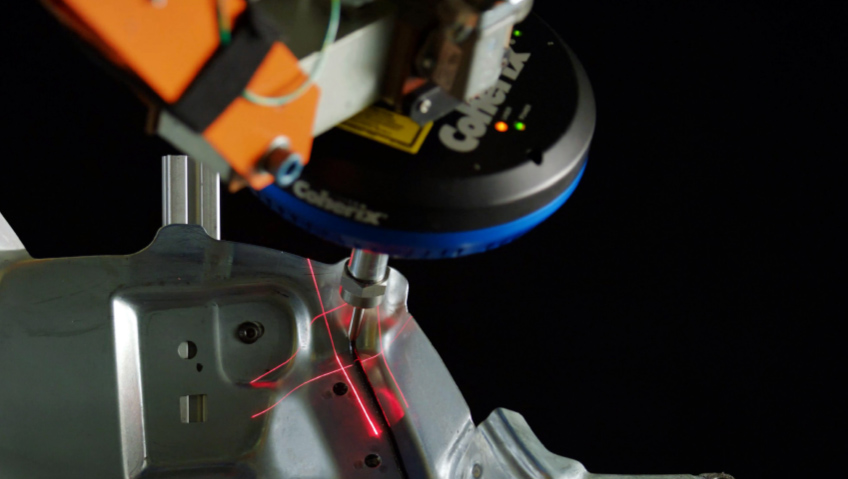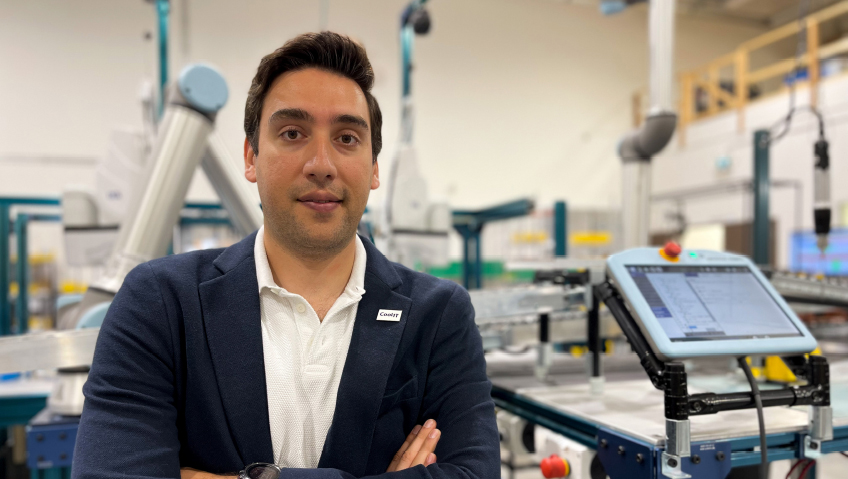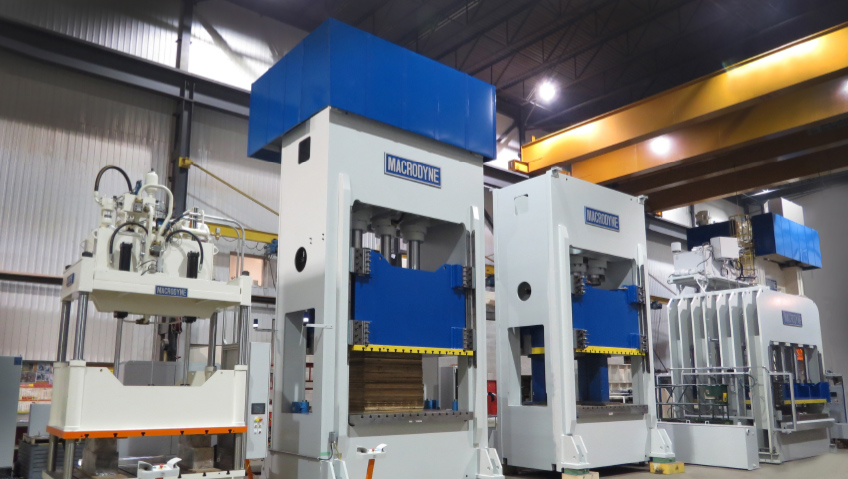ProAll International Manufacturing Inc.’s ongoing commitment to pouring concrete in a simpler and more environmentally friendly method has been a goal for more than 50 years, as the company strives to eliminate logistical issues and long wait times for delivery.
Driven by a desire to create the world’s most modern volumetric mixers and fuelled by superior in-house research and development, engineering, and production teams, ProAll is proud to reveal the development of its Spider 2.0 system designed to once again propel the company to the industry forefront.
“Spider 2.0 is basically the concept of a concrete business in a box,” explains Marius Swart, lead on the development of Spider 2.0 and CEO of 7SalesSteps. For ProAll, Spider 2.0 represents a revolution in volumetric concrete delivery – and in earning business.
“It wants to give the customer who uses the ProAll mixers the liberty to gather customers and serve them online, accept orders placed, dispatch trucks, invoice customers and provide service, follow-up, and backup to these customers,” says Swart.
This includes letting a customer experience equipment performance, including knowing where trucks are located, whether the equipment on the truck is operating as it should, and whether any preventative steps are needed. “It actually monitors every moving part on the truck and allows the owner to interact with that,” Swart says.
If a tank needs to be cleaned and is causing a hold-up, the system would indicate that via an array of dashboard items that can be monitored remotely, allowing customers to look at a truck and see, for example, what temperature it’s running at and how much water it has to mix with cement.
“It’s in this beautiful remote place, but you can interact with it and understand everything that’s going on with that truck,” says Swart.
For example, when the truck has completed pouring and the driver inputs the yards poured, an invoice can be prepared for the customer, and a note automatically sent through Spider 2.0 that delivery has been completed. “The product interacts with the customers and the drivers with side contacts, all through mobile interaction,” says Swart.
While the diagnostics interact with the truck and the dispatch functions with the office and the customer interactions, a third part helps the business owners obtain more customers.
“With this part, Spider provides a marketing function for the truck owners, which allows them to specify what type of customers they would like to reach out to, and in what proximity they would like them to be to the loading yards these trucks operate from,” says Swart.
This means the customer could specify the area within a chosen radius, whether city-wide or state-wide, for example, and be provided with a list of potential users of concrete truck services, such as those in paving; those in pool, residential, and commercial construction; and DOT service providers and utility providers.
The customer could then engage on the marketing side by sending monthly reminders of services provided and encourage people to register and receive information and learn about concrete and any specials available.
“We can build this community where people could learn more about concrete and we’d just stay in front of them,” Swart says. “When they’re ready to react, all they do is click a link on the website, and if they register, they don’t need to do anything.” If not, they can place their order and the entire process then automatically works from the beginning. In essence, he says, Spider 2.0 brings all the elements of a concrete business to the customers, making it as easy and hassle-free as possible.
“It allows companies to grow to a place they can handle,” he says. “There’s only so much capacity in a geographical area. It’s vast and there’s not a single organization that has kept all of it, but we can bring that vast universe of customers to a concrete company.”
If they say they can handle 1,000 more potential customers, ProAll can expand that marketing reach for them, while helping decide how many trucks are needed. “Then all that company needs to worry about is how many internal people they want to have in their business and how hard they want to work,” says Swart. “We feel we can help them understand their customer universe that’s out there.”
While Spider 2.0 isn’t operational yet, ProAll launched the initial version in January at the World of Concrete in Vegas. This featured a working demonstration to show customers the different markets and interactions through a working model. While there are no commercial customers yet, customers are testing various elements.
“Like all of these things, we have enough real-life input from people that use various components, and the diagnostics, dispatch, and marketing pieces have been around for a long time, but not necessarily in the concrete world,” says Swart. “As we feel the temperature of how hungry people would be for all the combined features, we will adjust our launch dates. We’re keeping our finger on the pulse.”
Spider 2.0 has been a huge accomplishment during a truly challenging few years dealing with supply chain issues, which can be extremely difficult for a manufacturer.
“Everyone has felt supply chain issues, but we have thousands of components that go on these mixers supplied by hundreds of suppliers from all around the world,” says Andrew Coates, Vice President of Sales and Marketing.
Other issues now include the challenge of buying truck chassis, with all manufacturers sold out for 2022, and sales now starting for 2023: It’s a huge hurdle to leap for a company that builds and sells concrete mixers, with more than 80 percent of those mounted on chassis.
ProAll has had some unexpected achievements, however, with a large amount of growth over the past few years.
“Prior to the pandemic we had 80 to 85 employees, and now we’re 150 plus,” says Coates. “We’ve almost doubled the size of the staff since the pandemic started. From the point of view of revenue and bottom line the company has grown substantially in the last 24 months, and that’s had challenges as well with hiring new people.”
It takes time to train new people, and it takes time for the person training them as well, he adds.
“It’s pretty incredible that we’ve increased production capacity by almost 100 percent in the last 18 months,” he says. “To do that while struggling through supply-chain issues and labour shortages and COVID restrictions and chassis shortages, is a real testament to the team that we have, and what we’ve been able to do in such a challenging environment.”
The construction industry is experiencing a boom, he says, with the concrete industry a part of that. Also, while mobile mixers and volumetric mixers have been around for 50-plus years, they’ve started to see an explosion in the industry.
“We might be growing a little quicker over the last year and a half, but all of our competitors have shown growth as well,” says Coates. “That tells me it could be the industry, but it’s also the adoption of volumetric mixers.”
These mixers improve quality control and quality assurance, allowing companies to take on work that maybe they couldn’t before and complete jobs with high engineering specs.
“I think ProAll is outpacing the boom because of the acceptance of the equipment and the automation of the technology that’s been added to the volumetric mixers,” says Coates.
And that growth is both a challenge and an accomplishment.
“It’s a double-edged sword,” Swart says. “It’s great that we’re having growth, but there have been quite a few challenges to that, and there continue to be as we look forward over 2022 and 2023. Outside the COVID challenges that may persist: we also have challenges of introducing new technology to a mixer and then having a misstep.”
Adoption is good, he adds, and companies will all move towards more and better technology, but that doesn’t mean you make the right step. So, as it moves forward, ProAll will continue to listen carefully to customers regarding what they’d like to see on mixers, and where technology or automation can genuinely make their life easier.
“We all know technology is going to become more integrated into our lives, whether it’s at work or at home, but how it’s integrated we don’t know,” Coates says. “When it comes to volumetric mixers, I don’t know what that’s going to look like in terms of the control system in five years, but we have an educated guess and by listening to customer feedback, we hope we implement the right technology.”
It’s this forward-thinking that sets ProAll apart from its competitors, adds Coates. “One of the things we pride ourselves on is building a mixer that has improvements and adjustments built on customer feedback,” he says. “That’s the reason we’ve got to the mixer that we build today versus what we built 10 years ago.”
While Coates believes his competitors have done that as well, he thinks ProAll “blazed the trail,” especially on automated equipment. “We were the first one to do that and we continue to lead the charge there.”
ProAll is looking to grow, expand, and be ready for volumetric mixers to become much more common than they are today, says Coates of this fairly niche product.
“With the growth we’ve seen over the last two years in the industry, I think our [targets] are really lofty because we believe we’re right at the beginning of a shift in the market.” “Volumetric mixers will never replace drums, but we believe they’ll grow to take on a larger share of the concrete space, the ready-mix space.”
That dedication to forward-thinking and customer service is only reinforced by ProAll’s Spider 2.0, a program that allows full control and full visibility of customer business.
“We feel we cannot oversell the importance of giving somebody the ability to run a business like a franchise,” says Swart. “The one thing that’s elusive is for a concrete company to understand the customers. It’s hard.” It’s hard to pre-plan that, while with Spider you can be very planned about how big you want your business to be at what time.
“The casual market hasn’t been touched in the U.S.,” Swart adds. “People still get concrete from a variety of sources, and the volumetric concrete delivered to homeowners and casual contractors – that market is very much untapped.”
“That’s another forward-thinking aspect and no one else is doing that,” says Coates. “We’re hearing what our customers are saying and trying to push in that direction. Both historically and still today it’s something that sets ProAll apart from other companies in this space.”

